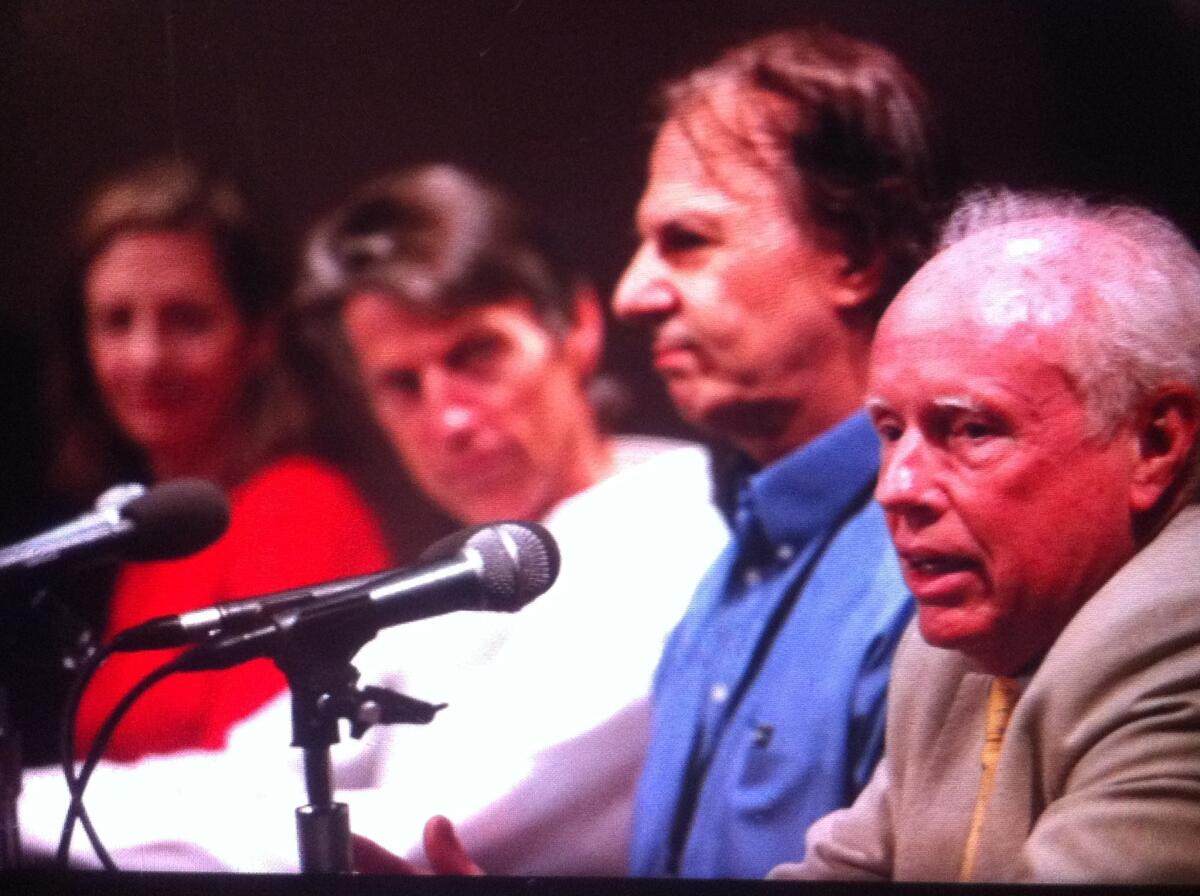What were they thinking? America’s enduring culture of argument

- Share via
We have, when you think about it, always been an argumentative culture and society, even before we became a country. And we’ve been arguing ever since, for better or worse, and with varying degrees of skill.
The nature of argument was part of the focus of the “American Arguments” panel at the Los Angeles Times Festival of Books on Saturday moderated by L.A. Times editor-at-large Jim Newton, which drew together four history authors whose books explore some of the key formative arguments of American history.
The takeaway: To understand the past, and its arguments, you have to understand the mind sets of those who were creating the history. Yet there was disagreement about the role of argument in writing that history.
“Every work of history is a combination of argument and narrative,” said H.W. Brands, author of “The Man Who Saved the Union: Ulysses Grant in War and Peace.” “The longer I write, the more I emphasize the narrative, the story, and the less attention I give to the argument. Arguments come and go.”
FULL COVERAGE: FESTIVAL OF BOOKS
Yet one can’t separate argument from narrative when writing history, countered Amy S. Greenberg, author of “A Wicked War: Polk, Clay, Lincoln and the 1846 U.S. Invasion of Mexico.”
“You can’t really make a narrative unless you have an argument to go along with it,” said Greenberg. And some of the arguments recur. Her book retells the story of a war that was predicated upon a lie -- an attack that didn’t occur -- and used as a means of gaining territory coveted by the Polk administration.
“One of the American arguments that I was setting out to address here … is what makes a war just, and what justifies a war,” she said. “It was a debate that people had at the time .… This is a debate obviously that continues to this day.”
VIDEO: AUTHOR INTERVIEWS FROM FESTIVAL OF BOOKS
The U.S. won that war handily, which led to a fresh wave of arguments during the slavery era over what to do with that land, an argument Fergus Bordewich re-creates in his “America’s Great Debate: Henry Clay, Stephen A. Douglas, and the Compromise That Preserved the Union.” The compromise hammered out by those legends of American oratory kept the union intact for another 11 years. Bordewich’s book, incidentally, won the Los Angeles Times Book Prize for history, which was announced Friday night.
John M. Barry’s book, “Roger Williams and The Creation of the American Soul: Church, State, and the Birth of Liberty,” explores an even earlier argument: the concept of separation of church and state, which Williams helped frame more than a century before the Constitution that put that concept into action.
Barry’s book began with research into the political and religious frictions of the early 20th century, but he found himself tracing the separation of church and state back to its roots.
“I thought I was writing about religious liberty and discovered pretty soon that I was actually writing about liberty itself,” Barry said. “Williams didn’t invent the concept of separation of church and state but he was the first person to put the argument together in a comprehensive way … and he was the first person to actually say a government has no more power, nor for a longer time, than the citizens consent to. That was an incredibly revolutionary statement, and the argument is actually ongoing.”
But the nature of that argument leaves a lot to be desired, according to Bordewich. The 19th century debate leading up to the Compromise of 1850 -- a two-year argument over the future of the country -- was an eloquent competition of visions and ideas, he said.
“This book is not an argument on my part about America today, but on the other hand it is kind of inescapable … to draw some conclusions about how poorly we argue today, how shallow our arguments are, and how few Americans in public life are able to speak coherent -- much less elegant -- English,” he said as the audience began a knowing laugh. “We as a people pay for the often unintentional obfuscation of modern speech.”
Irvine-based writer Scott Martelle is the author, most recently, of “Detroit: A Biography.”
More to Read
Sign up for our Book Club newsletter
Get the latest news, events and more from the Los Angeles Times Book Club, and help us get L.A. reading and talking.
You may occasionally receive promotional content from the Los Angeles Times.











